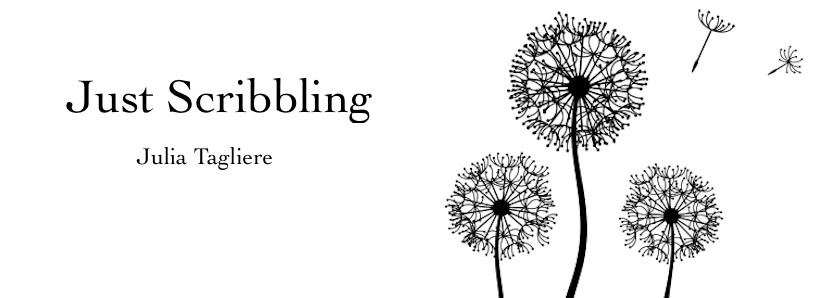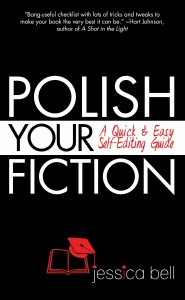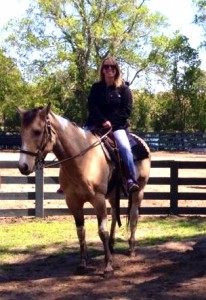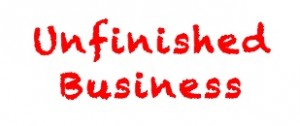[I am ridiculously excited to play hostess today to a very special guest: poet, editor, musician, and all-around fascinating writer, Jessica Bell, author of Polish Your Fiction: A Quick & Easy Self-Editing Guide. Enjoy! — Julia]
ARE YOU READY TO EDIT YOUR MANUSCRIPT? by Jessica Bell
I believe that editing and revising are two completely different things when it comes to a fiction manuscript. Revising involves altering and/or amending your story. Editing involves checking and improving accuracy and clarity. So, before you begin to edit your manuscript, you need to make sure you have revised it to the best of your ability.
I’ve put together a revision checklist for you in order to determine whether your manuscript is ready to be edited for publication. If your answer is the opposite of what is in brackets after each question, then you need to revise your manuscript again before moving onto the editing stage. You also may like to ask your beta reader/critique partner these questions to get a more objective perspective on your progress.
PLOT & PACING
—Does it have a clear beginning, middle, and end? (yes)
—Do your characters evolve throughout the story, i.e. do they change? (yes)
—Do your characters encounter obstacles along the way which prevent them from meeting their goals? (yes)
—Do your characters eventually overcome obstacles? (yes)
—Are there any sections of your book which seem to drag? (no)
—Do you ever want to skip over some scenes to get to “the good parts?” (no)
—Do you feel there are any scenes which end too quickly? (no)
—Is your story driven by an underlying question that readers need to know the answer to? (yes)
—Are there any major facets of your story you could remove without affecting your plot? (no)
—Does the major thread get resolved, or at least come to a realistic conclusion? (yes)
—Does the big reveal come close enough to the end? (yes)
SHOW, DON’T TELL
—Can you visualize what you are reading as though it were happening right in front of you? (yes)
—Can you feel the emotions your characters are feeling? (yes)
—Do your characters seem flat and lifeless? (no)
—Have you made your characters real? That is, would your readers recognize your characters if they met them on the street—without you using a lot of explicit exposition to describe them? (yes)
INCORPORATING SENSES
—Is the imagery vivid? (yes)
—When a character touches something, can you feel it? (yes)
—Can you hear the dialogue (and dialects, if applicable)? (yes)
—Can you hear everything your characters are hearing? (yes)
—Can you taste and smell all references to flavour and scent? (yes)
—Are you constantly using the words see, hear, touch, smell and taste? (no)
BALANCING BACKSTORY
—Are there any instances where you feel you are being told irrelevant information? (no)
—Are there pages and pages of backstory all clumped together? (no)
—Does your story begin with the backstory of the protagonist? (no) If yes, are you sure it’s necessary to your plot? (yes)
—Have you peppered necessary elements of backstory throughout your manuscript in relevant places that move the story forward? (yes)
—Does your backstory offer significant insight into your characters’ personalities, and is it important to readers’ understanding of the plot? (yes)
ELIMINATING CLICHÉS
—Are the actions of your characters often described using run-of-the-mill phrases? (e.g. She is driving me nuts.) (no)
—Are your characters stereotypes? (e.g. an intellectual that wears glasses, or a blonde big-breasted lifeguard) (no) If yes, are you sure they’re vital to your plot? (yes)
—Have you identified a unique slant to your story? (yes)
What do you think? Are YOU ready to edit?
Bio:
Jessica Bell, a thirty-something Australian-native contemporary fiction author, poet and singer/songwriter/ guitarist, is the Publishing Editor of Vine Leaves Literary Journaland the director of the Homeric Writers’ Retreat & Workshop on the Greek island of Ithaca. She makes a living as a writer/editor for English Language Teaching Publishers worldwide, such as Pearson Education, HarperCollins, MacMillan Education, Education First and Cengage Learning.
Connect with Jessica online:
Website | Retreat & workshop | Blog | Vine Leaves Literary Journal | Facebook | Twitter










